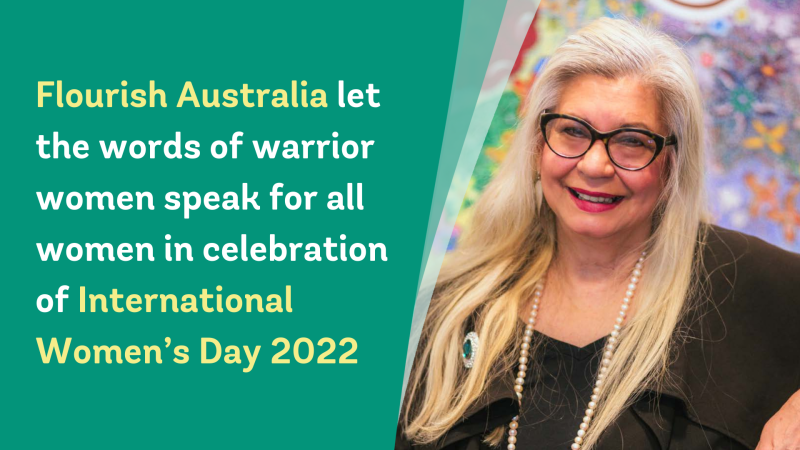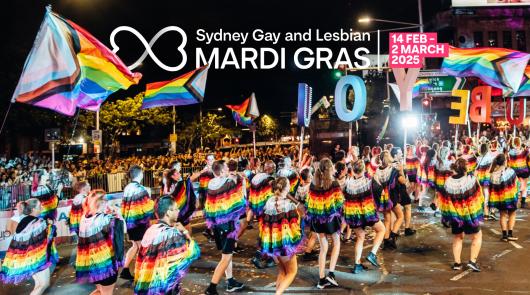
More than 300 people registered for Flourish Australia’s free Let’s Do Lunch webinar on Friday March 11, to celebrate International Women’s Day together with inspiring guest speaker, Professor Pat Dudgeon. Highlighting the absolute necessity of recognising the value of women, and restoring their role in community if we are to thrive as a society and preserve our cultural identity, Pat invited our own Jade Ryall to reflect on these truths in her own lived experience.
Welcome to Country was warmly delivered by Aunty Donna Ingram who had taken part in a National empowerment project among Indigenous communities with Pat. “I was touched by her heart for improving the societal wellbeing of all people. Flourish Australia always invite the most amazing people, whose own lived experience shows the importance of the work you do.”
Professor Dudgeon’s heart for building on the breakthroughs won for equality, by so many women over history, was reiterated by Flourish Australia CEO Mark Orr who said, “We are the organisation we are today because of the leadership of people with lived experience, built on the struggles of those who went before them.” Community Advisory Council Co-Chair Megan Paull went on to acknowledge the valued contributions of all women with lived experience.
Sharing Professor Dudgeon’s passion for the part cultural identity plays in individual wellbeing, Jade Ryall, Manager of Flourish Australia’s innovative Back on Track Health Program which empowers people to focus on their mental health and wellbeing, said: “When women speak, it’s powerful, Country hears it and swells with pride.” Likening community wellbeing to a fishing net, she said, “If a knot is weakened it adds to the load on all of the other knots, putting pressure on the whole. Learning from our elders and other women in community will keep us well and strengthen the whole.”
Professor Elizabeth More added, “We must challenge bias and stop it in its tracks by having the courage to take action,” citing Snow Medical challenging gender bias by withdrawing support for a University of Melbourne Fellowship Program that consistently overlooks the achievements of women.
"Hope for a future without bias was stirred as Pat Dudgeon spoke of reclaiming the power and place of women everywhere, standing on the shoulders of the many unsung heroes who fought to have a voice, break ground, or simply keep their families intact and their culture alive."
To determine what needs to happen or women to reclaim their place and voice, I did a deep dive into women’s perceptions of self and gender bias’s for my PHD in the early 2000’s. I grew up knowing that as Aboriginal women, we don’t stand alone, our ancestors and family are around us. Stories of severe oppression and surveillance shared by my mother and grandmother were an important frame of reference for my research. My Grandmother was called ‘Mother of Sin’ because she defied constraints of the system.
We still need to keep our eyes open to systemic bias creeping in. For example, while heading up the Centre for Aboriginal Studies at Curtin University, we had a policy of employing Aboriginal people yet it was brought to our attention that the lowest paid academics were women.
We stand together with white feminism for gender equality but there’s a deep difference in the experiences and conditions Aboriginal women speak out of.
A mentor and role model for me was Dr Joan Wench who pioneered Aboriginal healthcare training. Her emphasis on empowering the community is a legacy I want to see live on. I also see the work of June Oscar, ‘Women’s Voices, A Blueprint for Change’, as a framework for strengthening the role of our women.
My own research revealed that key priorities for Aboriginal women are to have more women as role models, in leadership and positions of influence, and for all people to love and respect one another. Barriers include historical injustice leading to family breakdowns, a tendency to cut down tall poppies, lack of confidence, shame, lateral violence and our own men holding us back.
Our women were once warriors but their names aren’t remembered. Women’s rights were diminished. Our commitment now must be restoration.
I see positive change in specific rights for Aboriginal women, such as birthing on country, movements like Me-Too and Black Lives Matter, and more dual leadership roles. These days we see women portrayed with power, and as warriors, in popular culture.
We can break bias across communities by implementing a new paradigm for non-western cultures to solve their local issues through indigenous practices and applications. Self-determination is key, making people a part of the dialog about policies that will impact them. By recognising the strength, resilience and diversity of our communities, The National Strategic Framework for Aboriginal and Torres Strait Islander social and emotional wellbeing is being made stronger.
We must view the health of First Nations people holistically. When the harmony of interrelating factors, including connection to country, is disrupted, ill health results.
Racism, stigma, social disadvantage all have impacts on health and wellbeing. Bringing cultural ways into health systems will better serve the needs of communities, empowering access, a localised workforce and the service system as a whole.
Encouragingly, many of the questions webinar participants put to Pat, were about how we can each be part of the solution.
Watch the full event video here or
Watch the highlight video of the event here
Talk to us today
For more information, contact us on 1300 779 270 or make an enquiry now.


